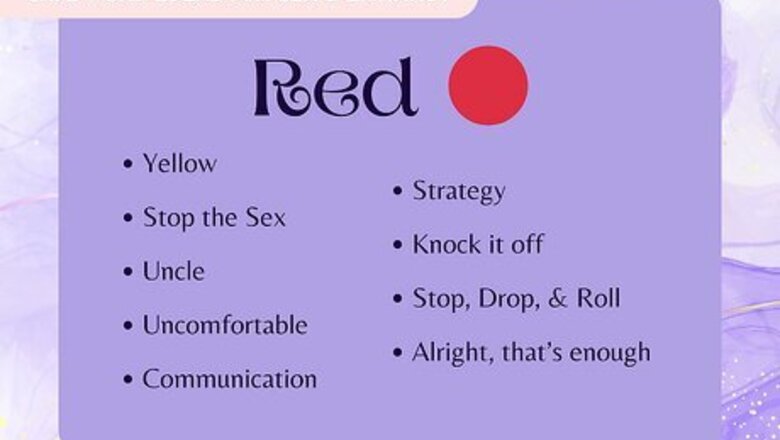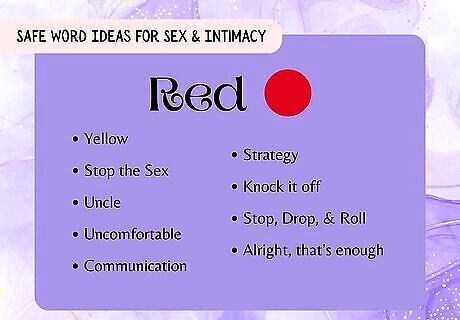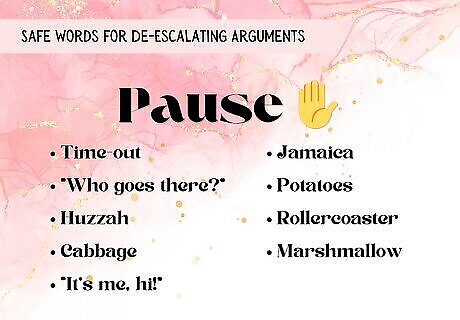
views
Safe Word Ideas for Sex & Intimacy

Red “Red” is a common safe word because it’s widely associated with “stop,” but it doesn’t use the word “stop” itself. It’s also clear, direct, and easy to remember. It’s also unlikely to be said during sex in any other context. Most of all, “red” can be used as part of a larger “traffic light system,” says Bezalel, in which individuals can use “red” to mean full-stop, and “yellow” to mean “slow down a bit” or “let’s check in before continuing.” Here are some other direct and literal safe word ideas for you to try out: Yellow Stop the Sex Uncle (as in, “say uncle,” which means to surrender or admit defeat) Uncomfortable Communication Strategy Knock it off Stop, Drop, & Roll Alright, that’s enough Meet the wikiHow Experts Danielle Bezalel is a sex educator and podcaster who specializes in sexuality and sexual and reproductive health. Jessica Swenson is a community psychologist, licensed clinical therapist, and sex therapist who specializes in romantic relationships. Jacqueline Hellyer is a licensed psychosexual therapist who specializes in sex advice, sex tips, and relationship advice.

Pineapple According to Bezalel, random words like “pineapple” or “pomegranate” are solid choices for a safe word because they don’t come up often in regular conversation, so you’re unlikely to accidentally say them during intercourse. Plus, they’re also funny and light-hearted enough to bring the moment to a stop without feeling super heavy or mood-killing. Also, by choosing a silly safe word, the whole conversation around choosing and using a safe word with your partner can feel easier and less stressful. Here are some other random and silly safe word ideas to try: Banana Parachute Abracadabra Filibuster Pterodactyl Bubble Gum Sassafras Yabba Dabba Doo Polkadot Macaroni Caterpillar Kalamazoo Tambourine Double Dutch Oklahoma

Justin Bieber Similarly to “pineapple,” you’re unlikely to say “Justin Bieber” or a similar, pop culture-oriented term during sex. It’s a silly, random thing to say during intimacy, but it also has several syllables—meaning you have to make an effort to say it, which signals that you have a clear and urgent need that must be met. Also, borrowing your safe word from a real-life place or pop culture moment can be easily personalized to your relationship. If you and your partner have a funny memory associated with Nickelback, for instance, using the band’s name as a code word could lighten the mood while still ensuring that everyone feels safe. Here are some more funny, pop culture-inspired safe words: Tamagotchi Beetlejuice Hufflepuff Jumanji Pikachu Nickelback Obi-Wan Kenobi Kentucky Fried Chicken Macintosh Thunderdome Schwarzenegger Constantinople Grease Lightning Geppetto Jesus Christ Superstar “Get out of my swamp”

Mercy “Mercy” is a relatively serious safe word, but that doesn’t mean it’s not just as good! It’s a bit more dramatic and weighty, but that means it holds a lot of power when used appropriately and firmly. If you and your partner’s intimacy style is very passionate, kinky, or intense, a safe word like “mercy” can be a good fit to prompt a check-in without completely breaking the spell in the bedroom. Here are some other emotional and serious words and phrases to use as safe words: Trust Be Kind Show Pity Respect See Me
Safeword This might seem basic, but using the term “safe word” can be one of the most effective safe words! It’s very simple, clear, firm, and impossible to misinterpret—or forget in the heat of the moment. Also, unlike similar phrases like “don’t” or “stop,” it’s unlikely to ever be said in another context while in the bedroom. It’s especially good for new partners or partners who are just starting to explore their boundaries with each other.
Safe Words for De-Escalating Arguments

Use a safe word like “pause” or “cabbage” to call time-out on an argument. With your S.O., agree ahead of time on a word or phrase that either of you can use when an argument is starting to spin out of control (once emotions are at their full height, using the safe word may not be a good idea). Consider a word that’s very neutral (“pause”), related to a positive memory (“Jamaica”), or descriptive of how your emotions are feeling in the present moment (“rollercoaster”). When the word is used, take an already-agreed-upon moment to cool down, take a break, hug, or connect before revisiting the topic later. Here are some ideas for this type of safe word: Pause Time-out “Who goes there?” Huzzah Cabbage “It’s me, hi!” Jamaica Potatoes Rollercoaster Marshmallow
Safe Words for Communicating a Dangerous Situation
Choose a natural, unsuspicious phrase to use as a safe word in emergency scenarios. Some people choose to prepare for emergency situations—e.g., abductions, robberies, break-ins, etc.—by sharing a code word with their friends and family. When agreeing on this code word, make sure to also decide on what should be done when you use it. This could include leaving the immediate area or calling the local authorities. When it comes to choosing the word itself, choose something that could be used casually without arousing suspicion, but that would clearly signal to anyone who knew you well that something is amiss. Here are some examples: “Peanut butter cups” How to Use It: If the person knows you’re allergic to nuts or strongly dislike peanut butter, say “Oh, I guess peanut butter cups,” like they’ve asked you what you want from the store. “Ice cream” How to Use It: If you’re dairy-free or strongly dislike ice cream, ask the person if you can get ice cream tomorrow or if they can pick some up. “Get gas” How to Use It: If the person you’re talking to doesn’t drive or drives an electric vehicle, ask them if they’re “stopping to get gas” on the way home. “Pick up Ruby” How to Use It: If you have no one in your life named Ruby, mention “picking up Ruby” or “talking to Ruby earlier” to send up some red flags. “Traffic on Main” How to Use It: Mention that there might be (or was) “traffic on Main” earlier, or another innocuous street name that doesn’t exist in your area or wouldn’t make sense with you or the other person’s daily routine. “Can’t wait to see your new haircut” How to Use It: If the person you’re talking to is bald or very rarely gets their hair cut, setting this as your safe word could feel natural to anyone listening, but bizarre to the person you’re talking to. “Oh, you’re picking up pizza? Can I get mushrooms on mine?” How to Use It: If your loved one knows you hate a particular ingredient (like mushrooms), asking for it could alert them that something is off. “Hold your horses” How to Use It: An unusual idiom like “hold your horses” can work well as a safe word—as long as you don’t use it in your everyday language! It can be naturally worked into most conversations to signal that something’s amiss.
What is a safe word and why is it important?
A safe word is a clear and preplanned signal that you need help or attention. In a sexual context, “safe words” are used when someone isn’t feeling comfortable during intimacy and needs to stop, take a break, or check in with their partner. Crucially, Bezalel says the safe word must be agreed upon ahead of time while the couple is clothed and sober. It should be clear that there won’t be any negative feelings or repercussions for using it, too. Safe words are often used during bondage, BDSM, or any type of restrictive sexual activity, but they can be useful for all types of sex. In other contexts, safe words can similarly serve as “code” for someone to check in or get support. For example, some couples use a “safe word” to prevent small arguments from spiraling. When they’re discussing something with a partner and start to feel bigger emotions rising up and getting out of control, they can use the safe word to prompt a break to cool down or an opportunity for reconnection. In other cases, family members will share coded “safe words” with each other to use in emergency situations. For example, if someone’s being held against their will but has the opportunity to text or call a loved one, they might use a coded message like “I’m just hanging out with cousin Ruby right now.” Since the person they’re speaking to should know that they don’t have a cousin named Ruby, they’ll be prompted to call the police or seek alternative help.
Safe words are important because they ensure that everyone feels safe. Particularly during sex and intimacy, Bezalel agrees that it’s important to use a safe word so that both partners understand when something needs to be quickly stopped, which ensures everyone’s boundaries are being respected. This can be particularly helpful during certain sexual activities, like BDSM or roleplay, where saying “no,” “slow down,” or “stop” could be part of the agreed-upon scenario. However, safe words can be important for communication during all types of sex, as you should always be trying to “be in touch with what you’re actually feeling, actually doing,” and whether or not you’re enjoying it, says licensed psychosexual therapist Jacqueline Hellyer. Sex therapist Jessica Swenson affirms that, “a lot of times, people don’t want to practice with a safe word, because they feel like it’s silly.” “However, if you’re going to get into things like restricting movement, tying, or anything that puts any sort of pressure on the airway,” continues Dr. Swenson, “you need to have some sort of safe word.” Bezalel advises that, “If you are engaging in an activity in which you cannot speak (if you are being gagged, for example), make sure you and your partner(s) discuss a non-verbal safe word to share non-verbally.” For instance, she suggests “holding a certain number of fingers up or tapping a certain amount of times.” Safe words can also be important in non-sexual contexts. For example, a code word used for emergency situations or stranger danger can be life-saving in some instances.
How to Choose a Safe Word with a Loved One
Talk to your partner or loved one about why you want a safe word. Sit down with this other person and let them know that you’d like to come up with a safe word for sex, conflict, or emergency situations. Remember that, in most cases, this doesn’t have to be an overtly serious conversation. Especially in the context of intimacy and conflict resolution, creating a safe word is more about fostering a safe space where both of you feel good and supported than it is about preparing for something to go wrong. If you need some help initiating this conversation, try something like: “Hey, could we chat about picking a safe word for anything we do in the bedroom?” “I read something interesting about using ‘red’ or ‘yellow’ to check in during sex. Would you be open to trying that?” “Let’s pick a word that feels light, simple, and easy to say or remember if either of us needs to take a breather. Do you have any ideas?” “I know that things can sometimes get heated when we’re discussing something. I’d love to try using a safe word to give us a chance to check in and reconnect. What do you think?”
Take into account what you’ll be using your safe word for. While some safe words might work across the board, certain situations call for a specific type of safe word. If your safe word is for intimacy, for example, you might want to choose a more passionate word like “mercy” or a nuanced one like “yellow” (for “slow down” or “adjust”). If you’re choosing a word to de-escalate an argument, you may want something that lightens the mood or reminds you and your partner of your connection, like “s’mores” if that’s your favorite treat to make and eat together. Then, for emergency-coded safe words that are used to communicate a dangerous outside threat, you need to think through what will seem natural to say to someone else and alert them to danger without arousing any suspicions. Similarly, tailor your safe word to who you’re using it with. If you and your partner are very playful and light-hearted in the bedroom, for example, something like “Thunderdome” or “macaroni” might work well. If your intimacy tends toward the deeper and more intense side, try “trust” or “show pity.”
Choose something that’s easy to say or remember. Your safe word will generally be used in heated or even uncomfortable moments—so Bezalel agrees that it needs to be “short, easily memorable, and clear.” Ensure it’s easy to say, too. If you’re out of breath, it shouldn’t sound slurred or easily misheard. On the flip side, you might want to choose something with multiple syllables, like “kalamazoo,” because you have to make an effort to say it, which will make it less likely to be misspoken or misunderstood.
Avoid any words that you might accidentally say in a given situation. Perhaps the most important part of choosing a safe word is that it’s not something you’d ever otherwise say in a certain context, agrees Bezalel. For example, during intercourse, words like “stop,” “no,” or “don’t” might get used or confused during roleplay or heated moments. For an emergency scenario, a common phrase like “come home” is something you’ll probably use when you’re not in danger, so you might accidentally alarm someone by using it on accident.




















Comments
0 comment